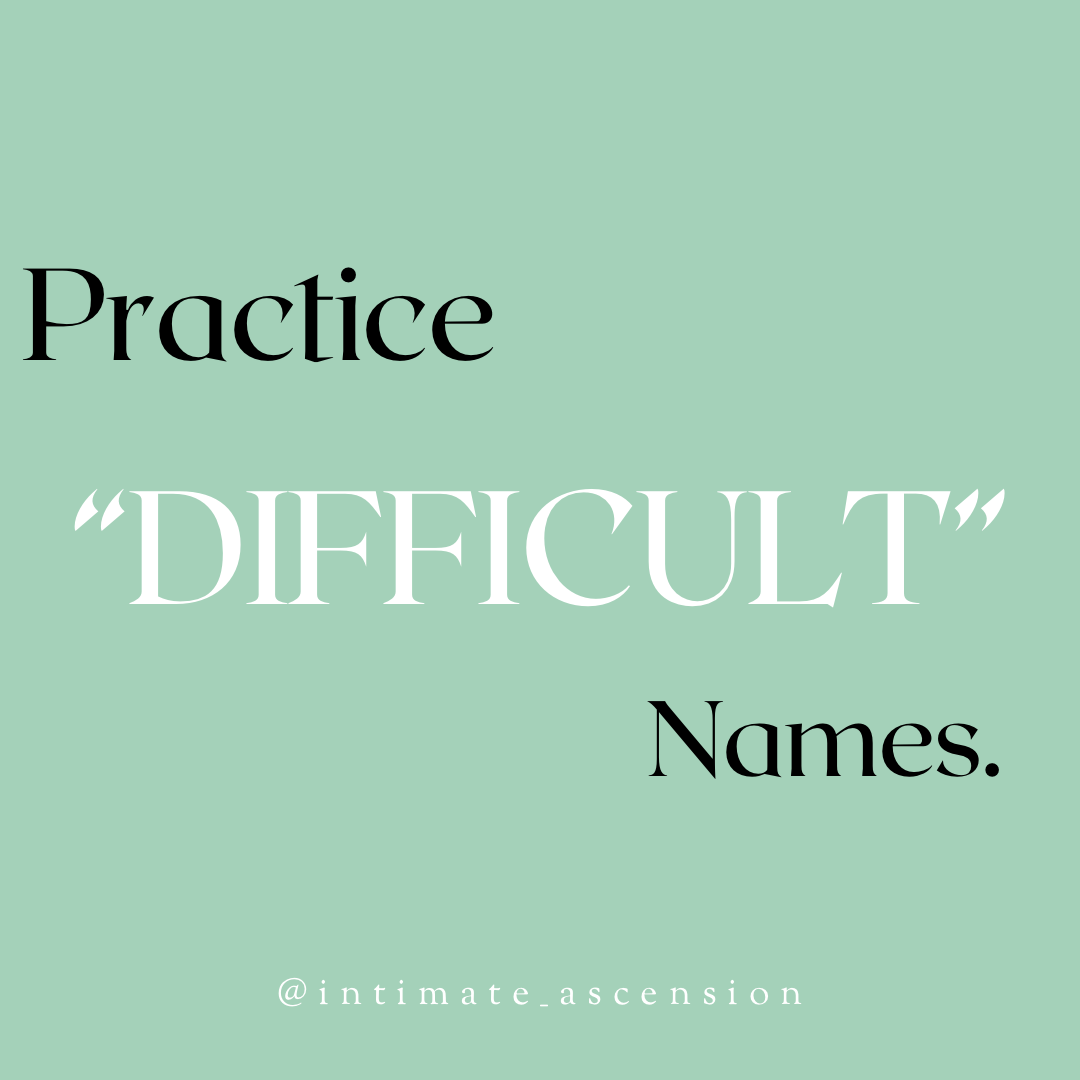My parents named me Skukura Aziza. My first and middle names are Swahili, a lingua franca of Eastern and Southern Africa that is greatly influenced by Arabic. My names mean “be grateful” and “precious/ powerful and beloved,” respectively. Shokran/Shukran in Arabic means “thank you”/”to give thanks,” and I’ve seen ashkuruka, meaning “I thank you.” Now, I don’t speak or know Arabic, so I believe these are the right translation spellings from what I’ve looked up. I remember my mother always reminding me of my name’s meaning whenever she felt I was acting like a “spoiled brat.” As I’ve grown, and gratitude has become a central part of my life and spiritual beliefs, I value my given name even more. I have immense pride in my name and carry it with all the innate strength and significance of my lineage and lively journey.
My younger sister and I both have Swahili names – something that was important to my parents when they had children. During my childhood, they made sure to keep us as connected to some resemblance of our roots and instill a pride in our Blackness. I remember in middle school, I once asked my mom if they ever even considered giving me an “American” or “normal” name; I think I was frustrated with never finding my name on keychains, and she said she deliberated potentially naming me Alexandria Elizabeth. After she told me that, I realized I didn’t want to be the 4th version of an Alex in my class; I’d rather keep my sense of distinctiveness.
My kindergarten teacher “couldn’t” pronounce it, my second-grade P.E teacher made fun of it one time, other Black kids in elementary school called it “ghetto,” most people didn’t bother to try to learn it and would probe for a nickname – or create one. I do have a nickname, by the way, and it was created because my brother couldn’t pronounce my first name when I was born… he was 2 at the time.

“What’s my mf’n name?!” – Ja Rule
Honestly, my name is not that complicated; phonetically, it is pronounced shoe-coo-ruh. I can’t even lie, I used to say it lazily – “shh-uh” instead of “shoe,” because it rolled off the tongue “easier” for English speakers. Sometimes, I’d throw in a pop-culture reference, “…like Tupac Shakur, but with an ‘a’ at the end.” I’m patient and would repeat my name as many times as needed, but there were still countless times where I’d give up and resign with “that’s close enough.” People would repeatedly stumble through the syllables until, frustrated and defeated, I’d tell them, “Just call me (insert nickname).” Growing up, I always knew when the teacher would get to my name during roll-call because there’d be a long pause. “Woods?” “It’s Skukura. Here.”
I remember when I worked at a predominantly white college, I was insulted every time this one coworker, in particular, would repeatedly spell my name wrong; it made me feel as if it didn’t matter because it was so “different.” Maybe it’s just me, but I know when I come across an uncommon – notice I didn’t say difficult – name, I make sure to double-check the spelling, as a sign of respect. Over the years, I’ve had every kind of made-up spellings – Skura, Shurukuks, Shuruka, and everything in-between.
Keep in mind, my email address and signature contained my first name. One exchange that will always stand out to me, this woman spelled my name differently every single time she wrote it.
“Hi (wrong spelling)…”
I reply, bolding my name.
“Ok, (another wrong spelling)…”
I reply.
“Thanks, (a third wrong spelling)…”
I reply. “My name is spelled, Skukura, by the way.”
She replied, with no apology of course – just an “Oh, (insert excuse).”
It was literally in her face multiple times, in multiple areas throughout the emails, but it felt like such a mindless refusal to take the time to acknowledge… me.

It became almost like a battle to be recognized for my full, authentic Self. I sign all my documents, introduce myself in professional spaces, etc. using my first name – I’m not ashamed of it; I love it. The most irksome thing would be when I’d introduce myself to someone as Skukura, and they might hear a close friend call me by my nickname, and next thing I know, the person I’d introduced myself to would be using my nickname, too. But I never gave you permission to use that or told you that was my name is the thought that would always cross my mind. I tell someone what to refer to me as and they basically decide, that’s not what I’m going to call you. That’s very bold and oppressive for someone to do – kind of like “My name is Kunta,” “You’re Toby,” kind of feeling. It’s a slight, an aggression, by calling me by something that you find more acceptable to your tongue and ear. It chips away at my ability to self-determine who I am. And yes, when I used to give in to others’ difficulties for their own comfort, I was denying and belittling myself – that’s why it never felt good when I did it. They’d introduce me to others by my nickname, and I’d, of course, cause confusion to visitors because I’d stick out my right hand and say, “Hi, my name is Skukura,” with a smile.
It’s no secret that, in America, our names are wrapped up in constructed concepts of race, gender and class. (Check out this brief article, too). It hurt me every time I had a student and I’d read this beautiful, cultural name full of meaning and then in parentheses see this westernized designation.
“Which do you prefer?”
“Well (such and such) is my real name… but you can call me; that’s fine.” Inadvertently saying that they know who they are, but they’ve come to accept the intolerance of others.
“Your name is so beautiful!” I’d offer to sit and learn how to pronounce their name; and, over time, the change in their esteem every time they’d hear their true title being used was so noticeable. I see YOU, not who you have been socialized to think you have to be in order to maneuver through society in a palatable way.
I got to a point where I refused to shorten or erase my name and continue the cycle of violence against the psyche of Black/African-American and other people of color with rich, evocative designations. I remember once when I was getting into a conversation about names with an Indian student, and as I was working on learning her name and more about its origins, she brought up her dad’s first name and then said, “…I never understood it, but he goes by Bob at work.” We delved into this a bit, because it seems so mundane but the history of the colonization of our forenames and surnames to fit a white ideal is not something to scoff at.
Historically, hosts of immigrants have chosen more “white”-sounding names to avoid discrimination or enhance business opportunities, the latter which is still a systemic problem whether the bias is positive or not. Still, I believe that when you are disconnected from your ancestors, from the culture that moves your soul, you end up lost in this world trying to make something fit at the expense of who you truly are because the bridge to your diasporic legacy is burned. (Side note: this is another case for when people say “I’m not into politics,” refusing to believe that your very existence and identity is ALWAYS political; yes, including your name.) Indeed, I understand the structures that exist and why certain groups of people actively remove their heritage from their moniker, but if you can’t tell yet, I’m not much of an assimilationist – for better or for worse. Names can be a form of eurocentrism that typically goes unquestioned.

Referring back to other Black elementary peers calling my name “ghetto,” you can see how internalized the supremacy of names can go. I worked at a Black-run non-profit one time, and I remember a high-level staff member commenting on some of the kids’ names and retorting that some were too difficult, asking for nicknames; and, in reality, they were just uncommon and needed a little extra time to get right. The funny thing was, the person who made these comments also had a very uncommon name – things that make me go hmm.
Sometimes I question, in general, people’s unwillingness to learn and try something new; to step out of their comfort zone. So many times, I’ve heard people laugh off my name with, “I can’t,” but the thing is, you can. It just takes a more attentive listening skill and a little bit of practice. I’m not rushing you to get it right. When we don’t step out of our comfort zone to learn these unpracticed names, you harm and limit not only others, but yourself. Anonymizing names, and thus, individuals, reduces their humanity instead of celebrating and appreciating who they are in their entirety.
Now, I don’t tell people my nickname – if you know it because you’ve known me for 6 or more years, fine, but I rarely, if ever, use it. I’m Skukura; and no, it’s not spelled incorrectly.
Take some time to reflect on what your name means.
